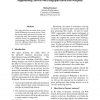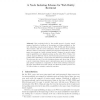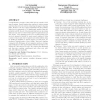WWW
2011
ACM
12 years 11 months ago
2011
ACM
Recently answers for fact lookup queries have appeared on major search engines. For example, for the query {Barack Obama date of birth} Google directly shows “4 August 1961” a...
COLING
2010
12 years 11 months ago
2010
Precision-oriented search results such as those typically returned by the major search engines are vulnerable to issues of polysemy. When the same term refers to different things,...
ACL
2008
13 years 6 months ago
2008
This paper describes the online demo of the QuALiM Question Answering system. While the system actually gets answers from the web by querying major search engines, during presenta...
ESWS
2010
Springer
13 years 9 months ago
2010
Springer
Now motivated also by the partial support of major search engines, hundreds of millions of documents are being published on the web embedding semi-structured data in RDF, RDFa and ...
WWW
2009
ACM
14 years 5 months ago
2009
ACM
Comprehensive coverage of the public web is crucial to web search engines. Search engines use crawlers to retrieve pages and then discover new ones by extracting the pages' o...
CVPR
2000
IEEE
14 years 6 months ago
2000
IEEE
Imagine a professional Web site designer who constantly has to come up with innovative looks for the client's homepages? How does he find the new content? The major search en...



